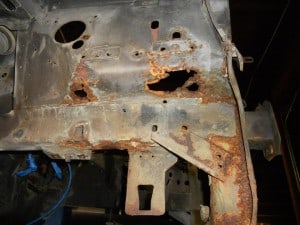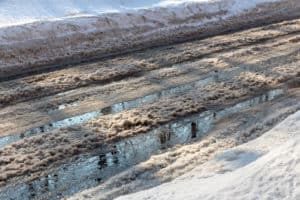Auto Rustproofing – New England Facts
Rustproofing and undercoating for a New England car or a truck
Rustproofing is a fairly new industry in New England, so it can be tempting to think that, like the salad shooter and the pet  rock, it’s just an annoying gimmick that will disappear faster the more we ignore it. In a culture heavily influenced by Scottish thrift and Abenaki (Native American, if you’re not from around here) aversion to waste, it feels virtuous to be suspicious of new products or services. After all, we’ve gotten along without it so far.
rock, it’s just an annoying gimmick that will disappear faster the more we ignore it. In a culture heavily influenced by Scottish thrift and Abenaki (Native American, if you’re not from around here) aversion to waste, it feels virtuous to be suspicious of new products or services. After all, we’ve gotten along without it so far.
Why would we suddenly have to buy it now?
But in the case of rustproofing, New England drivers may want to take a second look. In fact, it’s precisely to address problems like the waste of money and materials that the new rustproofing industry came to be. A few facts about rustproofing New England drivers should know:
More Corrosive Roads
- New England’s roads are becoming more corrosive all the time. Advances are constantly being made in how we deice our roadways. Unfortunately, the better those chemicals work at getting rid of snow and ice, the better they work at eating our cars. This is the biggest reason we didn’t use to rustproof our cars: road salt didn’t damage our vehicles nearly as much as it does now.
- Modern deicing mixes often contain bonding agents, added to keep the deicing chemicals from washing off of surfaces. This means the roadways are less likely to freeze after a cloudburst; it also means corrosive deicing chemicals are more likely to remain on our vehicles after a car wash.
- Modern deicing mixes often contain magnesium chloride, which can dissolve plastic and rubber parts such as protective cowlings and electrical insulation.
- Corrosion does a lot more than make our vehicles look bad. If left unchecked, it can cause dangerous situations and even death. Frames can literally snap in two, leaving broken vehicles sitting directly on the ground, held up on the ends by their now-useless wheels. Brake lines can rust through, causing accidents on the road. Sub-frames can fail, letting major parts like engines fall out. And some drivers have reported having their feet punch through the floorboards while driving.
- Today’s rustproofing technology is based on scientific studies and formulated to keep up to date with the changes in vehicle manufacturing and road maintenance.
- Modern rustproofing is a preventive maintenance measure that saves most New England vehicle owners several times its cost in repairs.
- According to the Canadian Automobile Association (CAA), we would prevent a significant amount of landfill waste and pollution if everyone in the salt belt had our vehicles rustproofed. For more on that, see “Why You Should Rustproof Your Vehicle,” by the CAA.
Prevention is Cure
 So if you’re one of those frugal and sensible people who like to save money, make things last, and keep your family safe, you’ll want to rustproof your vehicle. The first step is to take it to your mechanic and make sure it’s in decent shape. If any parts need replacing, you’ll want to do that before you get the rustproofing, so all the new parts get protected along with the old ones.
So if you’re one of those frugal and sensible people who like to save money, make things last, and keep your family safe, you’ll want to rustproof your vehicle. The first step is to take it to your mechanic and make sure it’s in decent shape. If any parts need replacing, you’ll want to do that before you get the rustproofing, so all the new parts get protected along with the old ones.
Then talk to your rustproofing professional about choosing the best type of protection for your vehicle. If it’s brand new, you can choose either the Boss wax/oil treatment or NH Oil Undercoating. If it’s badly rusted already, you’ll need a Rustoration rust conversion done, followed by the NHOU® option. In New England, rustproofing is provided by The Rust Stop Pros.

 Buy US Direct
Buy US Direct Buy CA Direct
Buy CA Direct Buy EU Direct
Buy EU Direct Buy DE Direct
Buy DE Direct